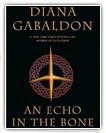Outlander aka Cross Stitch - Gabaldon Diana (библиотека электронных книг txt) 📗
The necessity of protecting Mr. Gowan’s saddlebags and the two wagons explained the presence of the twenty or so men who made up the rest of the rent-collecting party, I supposed. All were armed and mounted, and there were a number of pack animals, bearing what I assumed were supplies for the sustenance of the party. Mrs. Fitz, among her farewells and exhortations, had told me that accommodations would be primitive or nonexistent, with many nights spent encamped along the road.
I was quite curious to know what had led a man of Mr. Gowan’s obvious qualifications to take up a post in the remote Scottish Highlands, far from the amenities of civilized life to which he must be accustomed.
“Well, as to that,” he said, in answer to my questions, “as a young man, I had a small practice in Edinburgh. With lace curtains in the window, and a shiny brass plate by the door, with my name inscribed upon it. But I grew rather tired of making wills and drawing up conveyances, and seeing the same faces in the street, day after day. So I left,” he said simply.
He had purchased a horse and some supplies and set off, with no idea where he was going, or what to do once he got there.
“Ye see, I must confess,” he said, dabbing his nose primly with a monogrammed handkerchief, “to something of a taste for… adventure. However, neither my stature nor my family background had fitted me for the life of highwayman or seafarer, which were the most adventurous occupations I could envision at the time. As an alternative, I determined that my best path lay upward, into the Highlands. I thought that in time I might perhaps induce some clan chieftain to, well, to allow me to serve him in some way.”
And in the course of his travels, he had in fact encountered such a chieftain.
“Jacob MacKenzie,” he said, with a fond, reminiscent smile. “And a wicked, red auld rascal he was.” Mr. Gowan nodded toward the front of the line, where Jamie MacTavish’s bright hair blazed in the mist. “His grandson’s verra like him, ye ken. We met first at the point of a pistol, Jacob and I, as he was robbing me. I yielded my horse and my bags with good grace, having little other choice. But I believe he was a bit taken aback when I insisted upon accompanying him, on foot if necessary.”
“Jacob MacKenzie. That would be Colum and Dougal’s father?” I asked.
The elderly lawyer nodded. “Aye. Of course, he was not laird then. That happened a few years later… with a very small bit of assistance from me,” he added modestly. “Things were less… civilized then,” he said nostalgically.
“Oh, were they?” I said politely. “And Colum, er, inherited you, so to speak?”
“Something of the kind,” Mr. Gowan said. “There was a wee bit o’ confusion when Jacob died, d’ye see. Colum was heir to Leoch, to be sure, but he…” The lawyer paused, looking ahead and behind to see that no one was close enough to listen. The man-at-arms had ridden forward, though, to catch up with some of his mates, and a good four lengths separated us from the wagon-driver behind.
“Colum was a whole man to the age of eighteen or so,” he resumed his story, “and gave promise to be a fine leader. He took Letitia to wife as part of an alliance with the Camerons – I drew up the marriage contract,” he added, as a footnote, “but soon after the marriage he had a bad fall, during a raid. Broke the long bone of his thigh, and it mended poorly.”
I nodded. It would have, of course.
“And then,” Mr. Gowan went on with a sigh, “he rose from his bed too soon, and took a tumble down the stairs that broke the other leg. He lay in his bed close on a year, but it soon became clear that the damage was permanent. And that was when Jacob died, unfortunately.”
The little man paused to marshal his thoughts. He glanced ahead again, as though looking for someone. Failing to find them, he settled back into the saddle.
“That was about the time there was all the fuss about his sister’s marriage too,” he said. “And Dougal… well, I’m afraid Dougal did not acquit himself so verra weel over that affair. Otherwise, d’ye see, Dougal might have been made chief at the time, but ’twas felt he’d not the judgment for it yet.” He shook his head. “Oh, there was a great stramash about it all. There were cousins and uncles and tacksmen, and a great Gathering to decide the matter.”
“But they did choose Colum, after all?” I said. I marveled once again at the force of personality of Colum MacKenzie. And, casting an eye at the withered little man who rode at my side, I rather thought Colum had also had some luck in choosing his allies.
“They did, but only because the brothers stood firm together. There was nae doubt, ye see, of Colum’s courage, nor yet of his mind, but only of his body. ’Twas clear he’d never be able to lead his men into battle again. But there was Dougal, sound and whole, if a bit reckless and hot-headed. And he stood behind his brother’s chair and vowed to follow Colum’s word and be his legs and his sword-arm in the field. So a suggestion was made that Colum be allowed to become laird, as he should in the ordinary way, and Dougal be made war chieftain, to lead the clan in time of battle. It was a situation not without precedent,” he added primly.
The modesty with which he had said “A suggestion was made…” made it clear just whose suggestion it had been.
“And whose man are you?” I asked. “Colum’s or Dougal’s?”
“My interests must lie with the MacKenzie clan as a whole,” Mr. Gowan said circumspectly. “But as a matter of form, I have sworn my oath to Colum.”
A matter of form, my foot, I thought. I had seen that oath-taking, though I did not recall the small form of the lawyer specifically among so many men. No man could have been present at that ceremony and remained unmoved, not even a born solicitor. And the little man on the bay mare, dry as his bones might be, and steeped to the marrow in the law, had by his own testimony the soul of a romantic.
“He must find you a great help,” I said diplomatically.
“Oh, I do a bit from time to time,” he said, “in a small way. As I do for others. Should ye find yourself in need of advice, m’dear,” he said, beaming genially, “do feel free to call upon me. My discretion may be relied upon, I do assure you.” He bowed quaintly from his saddle.
“To the same extent as your loyalty to Colum MacKenzie?” I said, arching my brows. The small brown eyes met mine full on, and I saw both the cleverness and the humor that lurked in their faded depths.
“Ah, weel,” he said, without apology. “Worth a try.”
“I suppose so,” I said, more amused than angered. “But I assure you, Mr. Gowan, that I have no need of your discretion, at least at present.” It’s catching, I thought, hearing myself. I sound just like him.
“I am an English lady,” I added firmly, “and nothing more. Colum is wasting his time – and yours – in trying to extract secrets from me that don’t exist.” Or that do exist, but are untellable, I thought. Mr. Gowan’s discretion might be limitless, but not his belief.
“He didn’t send you along just to coerce me into damaging revelations, did he?” I demanded, suddenly struck by the thought.
“Oh, no.” Mr. Gowan gave a short laugh at the idea. “No, indeed, m’dear. I fulfill an essential function, in managing the records and receipts for Dougal, and performing such small legal requirements that the clansmen in the more distant areas may have. And I am afraid that even at my advanced age, I have not entirely outgrown the urge to seek adventure. Things are much more settled now than they used to be” – he heaved a sigh that might have been one of regret – “but there is always the possibility of robbery along the road, or attack near the borders.”
He patted the second bag on his saddle. “This bag is not entirely empty, ye ken.” He turned back the flap long enough for me to see the gleaming grips of a pair of scroll-handled pistols, snugly set in twin loops that kept them within easy reach.



